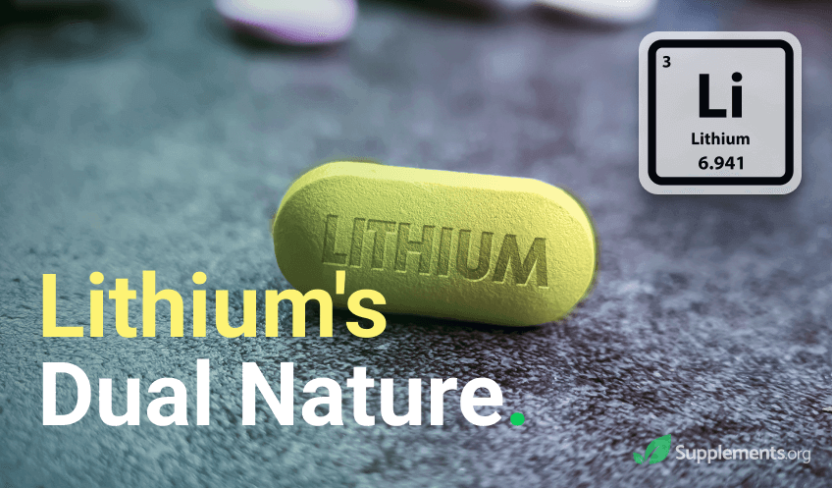Unveiling Lithium: A Boost for Mindful Serenity and Brain Clarity

Lithium, a soft, silvery-white alkali metal, carries a rich tapestry of history and significance, woven into the fabric of our lives in more ways than one. Its dual nature spans from its essential role in the realms of health and medicine to its natural occurrence and distribution in the environment.
Historical Use and Importance
Lithium has been making waves since antiquity, but not always in the ways you might expect. Today we recognize it largely for its therapeutic attributes, but its journey began quite differently. Ancient civilizations had come across sources of lithium, notably in mineral springs, without fully understanding its properties. They appreciated these waters for their supposed healing properties, a sentiment that unknowingly touched on lithium's future medicinal significance.
Centuries ago, healers from ancient, medieval, and Roman times tapped into the magic of special springs. They believed this water had the power to soothe those with affective disorders, calm the overly ecstatic, and bring tranquility to those caught in the whirlwind of mania. This was long before they could analyze or even pinpoint the Lithium within.
Fast-forwarding to more recent history, the 20th century saw lithium rise to prominence in the field of psychiatry. Its ability to act as a mood stabilizer revolutionized the treatment of manic-depressive (bipolar) disorders. Suddenly, a metal that was once just another element on the periodic table became a beacon of hope for many.
A fun fact that you may have heard of already - In the modern era, lithium has also found its way into our daily lives through batteries powering everything from your smartphone to electric cars. The lightweight nature of lithium, combined with its ability to hold a charge, makes it a cornerstone of the renewable energy movement.
Biochemical Significance
On the biochemical front, lithium plays a nuanced role in our bodies. Though not considered essential for human health, when introduced into the body, lithium interacts with several enzymes, hormones, vitamins, and growth factors. For instance, it has a hand in influencing the circadian rhythm, impacting how you sleep and wake. At a cellular level, it aids in the transportation of sodium, an essential electrolyte, helping maintain the delicate balance your cells need to function optimally.
Natural Occurrence
As much as we've learned to harness lithium's potential, it's worth noting that this element has been around, naturally occurring in the earth's crust, long before we recognized its value. Found in various minerals, lithium is not as rare as you might think. It's distributed in trace amounts in rocks, soils, and, interestingly enough, even in the water we drink.
Presence in Foods
Lithium is naturally present in various foods. Whole grains and vegetables are the primary dietary sources. Whether you’re eating whole grain bread or savoring a bowl of fresh greens, you're ingesting tiny amounts of this remarkable element. The amount of Lithium commonly found in your everyday meals is miniscule and that’s probably why you don’t hear of it often, but it’s certainly there.
Medicinal Formulations and Trade Names
When it comes to treating specific conditions, a more concentrated dose of lithium is required. In this context, it's not about the trace amounts in your food but specific medicinal formulations. Over the years, a variety of trade names and preparations have emerged in the pharmaceutical world. Common preparations include lithium carbonate and lithium citrate. You might recognize trade names like Eskalith, Lithobid, or Lithonate, all of which are designed to deliver therapeutic doses of lithium to those who need it.
A Bit of History
Lithium was first used in the 19th century for various medical purposes, but its specific application as a mood stabilizer for the treatment of bipolar disorder began in the mid-20th century.
The pioneering work in this domain was done by an Australian psychiatrist, Dr. John Cade, in the late 1940s. It started with a very strange experiment involving the urine of people with what was then known as “mania” being introduced in the bodies of guinea pigs. In short, he found that the urine of people with mania was far more lethal. This was the beginning of his groundbreaking research. Following his discovery, and analysis, lithium went on to become the gold standard in treating bipolar disorder.
Before this point, any serious application of Lithium for medicinal purposes was a matter of speculation. The element was even added to certain soft drinks, with no medicinal or nutritional intent, scientifically speaking. Suffice it to say that before 1949, Lithium was an almost complete mystery.
Nowadays, Lithium is commonly prescribed for the following conditions:
- Bipolar Disorder
- Major Depressive Disorder (as an adjunct)
- Schizoaffective Disorder
- Aggression and impulse control disorders
- Preventive treatment for certain cluster headaches
The Science and Treatment
It’s commonly accepted that Lithium naturally reduces glutamate and dopamine in the brain whilst also increasing inhibitory neurotransmitters. And yet, the exact mechanism of action of lithium isn't fully understood. It is believed to modulate various neurotransmitters and second messengers in the brain, which leads to a calmer, more tranquil state of mind. That’s what makes it a natural fit for people with mood disorders. It calms you down.
Lithium Vs. SSRIs

You may have heard of SSRIs which are a more common modern solution for affects like bipolar disorder, but the simple truth is that because of the drastically different chemical nature of those medication and Lithium, it’s really difficult to draw a comparison between the two. SSRIs directly affect serotonin reuptake, by inhibiting it – that’s the acronym. However, small doses of lithium have been found to increase the sensitivity of receptors to serotonin. It’s still a very muddy area of medical research.
There are many types of medication that are commonly discussed when it comes to the treatment of mood disorders, and among different categories, they don’t seem to be connected to one another. The main reason for this is that mood disorders aren’t exactly “cured” in the conventional sense. There is a lot of research in the direction of trying to actually cure bipolar disorder, as an example, but if you suffer from bipolar disorder or any other source of manic episodes, you might also be interested in suppressing the symptoms of the disease, while you try your best to live your best life.
This is where chemicals like Lithium come in. We know that it soothes you, plain and simple. This is why your physician might consider prescribing it as a steady solution to help you control your general mood over an extended period of time. Chemically, Lithium doesn’t seem to have any ability to cure mood disorders, any more than SSRIs do, but the symptom control is well documented.
Shocking Discoveries About Lithium – The Texas and Japan Studies
Two prominent studies conducted separately in Texas and Japan have gained considerable attention for their exploration of lithium levels in drinking water and the potential implications for public health.
Texas Study
In the state of Texas, researchers discovered a significant inverse correlation between lithium concentrations in the public water supply and rates of suicide, homicide, and rape. In essence, areas with higher levels of lithium in their water supply witnessed fewer cases of these violent outcomes.
The results weren’t conclusive enough to prove that Lithium was in direct control of the overall violence and erratic behavior of the populace, but this was one large step towards understanding that Lithium does seem to make some difference in that area.
Japan Study
A similar research project in Japan came to similar conclusions. Here, higher lithium levels in tap water were associated with lower overall mortality rates. And, interestingly, even after adjusting for suicides, there was still a correlation. This Japanese study reinforced the intriguing idea that trace amounts of lithium in drinking water might offer protective health benefits.
From the Research
It’s really difficult to isolate exactly what role Lithium had in the general mind state of the people that became part of the above statistics in Japan and Texas, but when you cross reference this information with the already known soothing effects of Lithium, there’s enough to conclude that at the very least, Lithium is beneficial across the board in having a soothing effect, before taking into account other factors. Meaning, you can’t just give everyone Lithium in hopes they’ll have a better day – there’s more to the science.
The Dangers of Lithium
Lithium has a narrow therapeutic index, which means there's a small margin between an effective, therapeutic dose and a potentially toxic dose. That's why individuals on lithium therapy need regular blood tests to ensure their lithium levels remain within the therapeutic range. This is more relevant to people who are actively taking high doses of Lithium as prescribed by a doctor, but it doesn’t mean that people who are simply supplementing with smaller doses of Lithium are completely exempt from the same dangers.
Common Side Effects
- Thirst and increased urination.
- Weight gain.
- Hand tremors.
- Nausea or diarrhea.
- General fatigue or lethargy.
Always be on the lookout for indications of overdose, regardless of the supplement that you are taking.
Dangerous Side Effects
There are also more dangerous, but less common symptoms of Lithium overdose that have been studied well over the years:
Kidney dysfunction
The kidneys play a crucial role in filtering and eliminating lithium from your body. Over time, chronic exposure to lithium can reduce the kidney's ability to concentrate urine, leading to a condition called nephrogenic diabetes insipidus. This results in excessive thirst and urination.
In prolonged cases, and especially if not managed properly, this can progress to chronic kidney disease. The risk increases with the duration of lithium treatment and higher blood lithium levels.
Hypothyroidism
Lithium can interfere with the thyroid gland, leading to reduced thyroid function. Lithium can interfere with the synthesis and release of thyroid hormones (T3 and T4) from the thyroid gland. It also inhibits the release of thyroid-stimulating hormone (TSH) from the pituitary gland.
Reduced thyroid function, or hypothyroidism, can result in fatigue, weight gain, cold intolerance, constipation, and depression among other symptoms. It's essential to recognize and treat this, as untreated hypothyroidism can lead to more severe complications.
Hyperparathyroidism
Elevated calcium levels in the blood due to overactive parathyroid glands. Lithium is known to increase the set point of calcium for the parathyroid hormone (PTH) secretion. This can result in increased PTH secretion even when calcium levels are already elevated, leading to hyperparathyroidism.
Elevated levels of calcium in the blood, or hypercalcemia, can lead to kidney stones, bone loss, abdominal pain, and neuropsychiatric symptoms. Over time, untreated hyperparathyroidism can lead to complications affecting the bones, kidneys, and cardiovascular system.
In essence, while these side effects are less common, they underscore the importance of consistent monitoring when on lithium therapy. Early detection and intervention can prevent more serious complications down the road.
Modern Medicinal Practice

Different Forms of Lithium
Lithium is available in various salt formulations, and among them, lithium carbonate and lithium orotate (often mistakenly called lithium aurate) are two that have garnered a lot of interest. Many of the studies that cite Lithium as a tested treatment for mood disorders refer to lithium carbonate, which is a significantly more aggressive form of lithium. However, lithium orotate has also been used to treat anxiety effectively.
Officially, Lithium Carbonate has a long history of clinical use with extensive research backing its efficacy and safety (when monitored appropriately). Lithium orotate truly hasn’t been explored nearly as much. The evidence of helpful application is weaker, but it’s still there.
Lithium aspartate is also available as a supplement. It, like lithium orotate, it's sold as a dietary supplement and can be purchased without a prescription. It's another form of lithium bound to an amino acid.
There’s also Lithium Oxybutyrate, which is used in smaller quantities than carbonate, but is more active and has less pronounced side effects. Lithium Nicotinate (Litonite) is used in the complex therapy of chronic alcoholism.
The Limitations of Aspartate, Carbonate and Orotate
The difference between Lithium Carbonate and the other available forms of Lithium supplementation boils down to the concentration of Lithium within. In short, the FDA and other such organizations do not find it safe to encourage over-the-counter overconsumption of Lithium in extremely high doses. If you suspect you might need that kind of therapy, you have to consult a physician immediately.
On the other hand, the over-the-counter variants are weaker doses with the same essential purpose, but they’re much safer for consumption.
Protective Measures against Kidney Failure
Chronic use of lithium, especially at high therapeutic doses, can potentially affect kidney function, leading to reduced glomerular filtration rate or, in rare cases, kidney failure.
There's preliminary evidence suggesting that low doses of lithium might have protective effects against kidney damage. It's thought that lithium might reduce inflammation and fibrosis in the kidneys, though the exact mechanisms remain under study. You need adequate hydration, regular monitoring of kidney function, and regular consultation with your physician to control the levels of Lithium you are taking, in order to perfectly protect your kidneys.
Oncology Applications
Some research indicates that lithium could inhibit the growth of cancer cells in certain types of cancer, like colorectal cancer. The mechanism might be related to its inhibition of the enzyme glycogen synthase kinase-3 (GSK-3).
Lithium's role in oncology is not yet fully established, but research is ongoing. Some are interested in its potential as an added part of established cancer treatments, particularly due to its relatively safe nature.
Headache Relief
Some studies suggest that lithium can be effective as a prophylactic treatment for cluster headaches and, to some extent, migraines. The exact mechanism is unclear, but it's believed to involve stabilization of serotonin levels in the central nervous system. For headache relief, lower doses are often effective, which also reduces the potential for side effects. This means that Lithium supplementation could indirectly assist those with chronic migraine issues.
Lithium's Interaction with Neurotransmitters
Lithium appears to enhance the release and inhibit the reuptake of serotonin, a neurotransmitter that plays a key role in mood regulation. This is believed to be the likeliest source of Lithium’s soothing effects on mood.
Lithium can modulate dopamine release and receptor sensitivity. By doing so, it helps in balancing the dopamine levels in the brain, which can affect mood and behavior.
Lithium can also affect the turnover and release of norepinephrine, another neurotransmitter involved in mood and alertness.
GABA: There's evidence that lithium increases the levels of gamma-aminobutyric acid (GABA) in the brain. GABA is an inhibitory neurotransmitter, which might contribute to lithium's calming effects.
Diet, Treatment and Supplementation
The dose of Lithium that you can acquire from your regular diet is very low, approximately 1-3 mg.
Lithium in doses from 800 to 2000 mg is prescribed to people with depression that cannot be treated with antidepressants and bipolar disorder.
For acute mania or severe instability: 1,800 mg to 2,400 mg/day of lithium carbonate or more, depending on blood levels and clinical response.
Consider this a general comparison to give you an idea of the huge difference between naturally acquired Lithium and supplemented Lithium dosage.
Over the Counter
Lithium Orotate - This is the most common form of lithium available as an OTC supplement. It's composed of lithium (the ion) and orotic acid, and it's claimed that this combination allows for better absorption and distribution in the body.
The lithium content in these supplements typically ranges from 1 mg to 5 mg per tablet or capsule. Some products might offer higher amounts, but the 1-5 mg range is most common.
Lithium Aspartate - Another form sometimes found in OTC supplements. It's similar to orotate but bound to aspartic acid. Dosing is similar, typically providing around 1-5 mg of elemental lithium per dose.
Most people take these supplements once daily, though the frequency might vary based on personal preference and perceived needs.
Some use it as a daily supplement indefinitely, while others might only use it during times of increased stress or mood fluctuations.
It's not uncommon for individuals to combine lithium supplements with other mood-enhancing or cognitive-boosting supplements, though one should always research and ensure there's no potential for adverse interactions.
While the doses in OTC supplements are much lower than in prescription medications, users should still be aware of potential side effects or interactions with other supplements or medications. It's always a good idea to consult with a healthcare provider before starting any new supplement, even if it's available over the counter. Talk to your physician. It cannot be understated.
Conclusions
Lithium is a very potent element, supplement, nutrient and component of our everyday lives. It’s not often talked about, but medical scientists have been aware of its potential for millennia. We’ve only recently started discovering and pinpointing the power of Lithium in both minute and large doses and it’s irrefutable that this powerful element does indeed improve a lot of medical conditions across the board – with a lot to be said about the dangers of overdosing and conflict with other medications.
As a supplement, Lithium is relatively benign, since the supplements that are available over the counter are only allowed in very small doses. Still, while you can purchase Lithium supplements over the counter, consulting your physician, even if it is for a bit of cursory advice, is recommended. It is always the safest approach.
References
- https://pubmed.ncbi.nlm.nih.gov/12154153
- https://examine.com/research-feed/study/1jlNY9/
- https://pubmed.ncbi.nlm.nih.gov/22796912
- https://pubmed.ncbi.nlm.nih.gov/30293574/
- https://www.ncbi.nlm.nih.gov/pmc/articles/PMC3574462/
- https://pubmed.ncbi.nlm.nih.gov/270894/
















